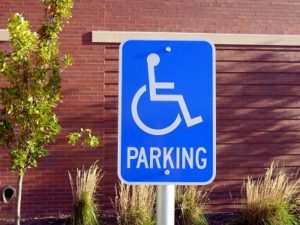 By Clark Wu | Law Clerk at Rose Law Group
By Clark Wu | Law Clerk at Rose Law Group
Arizona has become a hotbed for American with Disabilities Act (ADA) compliance lawsuits, with hundreds of new suits filed every month and no end in sight. While this may no longer be news for many business owners, what may come as a surprise is that signage violation claims are becoming increasingly popular.
In the wake of ADA litigation, many business owners are surprised to find themselves summoned to court to answer for non-conforming handicap signs. Yes, the very handicap signs they in good faith erected in their parking lots to comply with ADA.
Most business owners are aware that under ADA, they must provide handicap signs for their accessible parking spaces. Even so, simply erecting a sign is not enough, because the ADA has strict and complex sign requirements.
For example, all accessible parking spaces must be identified by signs that include the international symbol of accessibility. In addition, van accessible parking spaces must include the additional phrase “van-accessible” on the sign.
These regulations are governed by the total number of parking spaces, accessible and non-accessible, within the parking lot. Parking lots with fewer than four parking spaces total do not need to provide signs for their accessible spaces. This often creates confusion for business owners, who may mistakenly believe no signs are required if there are fewer than four accessible parking spaces, only to receive an ADA violation.
In addition, a business owner who has complied with the federal ADA standard may still be in violation because many local governments enforce additional signage requirements that may vary by the city.
For example, in Phoenix, business owners providing parking in parking garages or under shaded canopies must provide special accessible spaces for high-profile vehicles with a minimum headroom clearance of eight feet two inches. These types of accessible spaces require special signage indicating where such spots are located in addition to the regular handicap signs.
Also, all regular handicap parking signs in Phoenix must be identified with the following minimum verbiage: “Reserved Parking” and “Phoenix City Code.” Newer signs must follow minimum size requirements, 12 inches wide by 24 inches high and be permanently mounted to an approved stationary post or wall, five to six feet above the parking surface.
To make matters more perplexing, the standards for federal ADA compliance and local regulations differ depending on when the parking lot was constructed, when the signs were erected and if any alterations were made to the parking lot and/ or signs. Understanding the differences of ADA signage requirements is a frequent source confusion for business owners.
In the midst of the mounting ADA litigation in Arizona, the best way to avoid litigation is to become ADA complaint, but conforming can be a confusing process. The complexity of ADA regulations makes compliance a daunting task even for the most savvy business owners, and an experienced attorney can often help advise.
If a demand letter has been sent or a lawsuit filed, an ADA-experienced attorney can help protect the business, along with reducing costs and stress from prolonged litigation. However, being proactive and ensuring compliance may prevent that expensive process from happening altogether, providing business owners with peace of mind.








